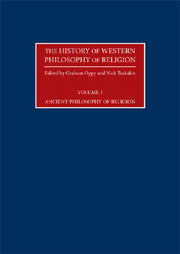Book contents
- Frontmatter
- Contents
- Editorial Introduction
- Contributors
- 1 Ancient Philosophy of Religion: An Introduction
- 2 Pythagoras
- 3 Xenophanes
- 4 Socrates and Plato
- 5 Aristotle
- 6 Epicurus
- 7 The Stoics
- 8 Cicero
- 9 Philo of Alexandria
- 10 The Apostle Paul
- 11 Plutarch of Chaeroneia
- 12 Sextus Empiricus
- 13 Early Christian Philosophers: Justin, Irenaeus, Clement of Alexandria, Tertullian
- 14 Origen
- 15 Plotinus
- 16 Porphyry and Iamblichus
- 17 The Cappadocians: Basil of Caesarea, Gregory of Nazianzus, Gregory of Nyssa
- 18 Augustine
- 19 Proclus
- 20 Pseudo-Dionysius
- Chronology
- Bibliography
- Index
5 - Aristotle
- Frontmatter
- Contents
- Editorial Introduction
- Contributors
- 1 Ancient Philosophy of Religion: An Introduction
- 2 Pythagoras
- 3 Xenophanes
- 4 Socrates and Plato
- 5 Aristotle
- 6 Epicurus
- 7 The Stoics
- 8 Cicero
- 9 Philo of Alexandria
- 10 The Apostle Paul
- 11 Plutarch of Chaeroneia
- 12 Sextus Empiricus
- 13 Early Christian Philosophers: Justin, Irenaeus, Clement of Alexandria, Tertullian
- 14 Origen
- 15 Plotinus
- 16 Porphyry and Iamblichus
- 17 The Cappadocians: Basil of Caesarea, Gregory of Nazianzus, Gregory of Nyssa
- 18 Augustine
- 19 Proclus
- 20 Pseudo-Dionysius
- Chronology
- Bibliography
- Index
Summary
Aristotle (384–322 bce) was a native of the Macedonian city of Stagira, now in northern Greece. His father, Nicomachus, was a physician at the Macedonian court. In 367, at the age of seventeen, Aristotle went to Athens, where he was attached to Plato's school, the Academy, until Plato's death in 347. Aristotle then moved to Assos on the coast of Asia Minor; he married Pythias, niece of Hermeias, ruler of Assos, and had by her a daughter, Pythias. (After his wife's death Aristotle formed a liaison with Herpyllis, with whom he had a son, Nicomachus.)
Further moves took Aristotle to the Aegean island of Lesbos, and then back to Macedon, where he acted as tutor to Alexander the Great. In 334 Aristotle returned to Athens where he founded his school, the Lyceum. Despite his long periods of residence in the city, Aristotle was not an Athenian citizen. When, because of the politics of the moment, anti-Macedonian feeling ran high in Athens, Aristotle's links with the Macedonian court were a liability for him. In this atmosphere in 323 it became prudent for him to leave Athens again, this time for Chalcis in the nearby island of Euboea. Aristotle died there the following year.
By some estimates the works of Aristotle's surviving corpus represent about half of his actual output. These works lie at the foundation of almost every branch of Western philosophy and science apart from mathematical theory.
- Type
- Chapter
- Information
- The History of Western Philosophy of Religion , pp. 79 - 92Publisher: Acumen PublishingPrint publication year: 2009



